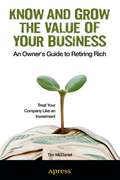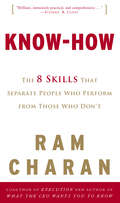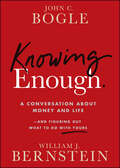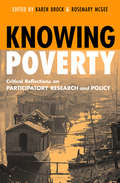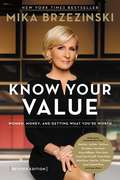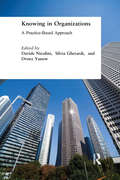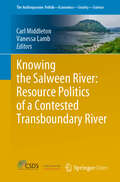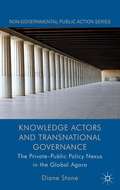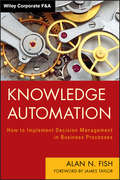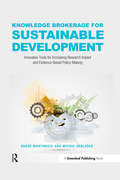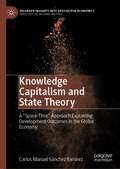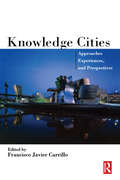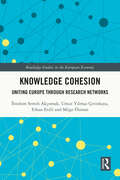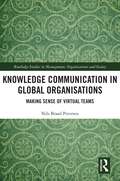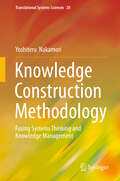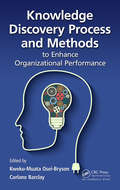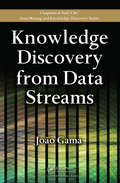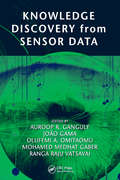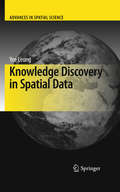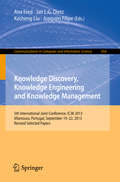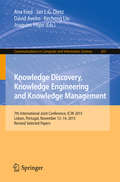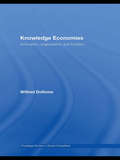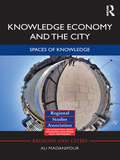- Table View
- List View
Know and Grow the Value of Your Business: An Owner's Guide to Retiring Rich
by Tim McdanielA woman looking to retire said to author and valuation expert Tim McDaniel, "I need to sell my business for $2.5 million to support my country club lifestyle." The reality was that her business was worth $750,000. How could she have been so wrong? As McDaniel-a veteran of over 2,000 valuation engagements and dozens of M&A deals-knows all too well, most owners work in their businesses and not on their businesses. He has seen the look of surprise on client faces far too often: "It's only worth that much?!" In the rush of day-to-day work and decisions, business owners sometimes forget that their business is an investment-and something they need to watch, nurture, and care for just as they would a valuable antique vase or painting. Know and Grow the Value of Your Business: An Owner's Guide to Retiring Rich shows readers how to develop the "investment mindset," value the business, bolster that value and maximize the return on their investment, and, finally, exit the business either through a sale to outside parties or by passing it on to family or other business insiders. This information couldn't be more important: Typically, 60-80% of a business owner's wealth is tied up in the value of the business. This is their most important asset, but they usually guess at its value and have no concrete plan to increase it. That's why this book shows: The importance of treating your ownership interest in a business as something deserving near-daily attention. How a company is valued, and how others outside the business view that value. Steps you can take immediately to increase the value of your business. The different kinds of potential buyers and what attracts them. How to remove yourself from the day-to-day work of the business to plan for a brighter future. How to exit the business on your terms. In short, this book helps business owners get the most for their business when they decide it's time to move on.
Know and Show Yourself--Enough: How to Be a More Effective Leader
by Gareth Jones Rob GoffeeIt is unlikely that as a leader you will be able to inspire, arouse, excite, or motivate people unless you can show them who you are, what you stand for, and what you can and cannot do. This chapter explores how leaders come to know and deploy their differences and illustrates the impact this has on their followers.
Know-How: The 8 Skills That Separate People Who Perform from Those Who Don't
by Ram Charan Geri WilliganIn this ground-breaking new book, Ram Charan, co-author of the bestselling Execution, redefines leadership by focusing on eight specific practical skills that, if mastered, are guaranteed to bring success. 1. Positioning andshy;andshy;u andshy;andshy;andshy;formulating a clear central idea that chimes with your customers' desires and allows the business to be profitable. 2. Detecting patterns u recognising key variables that may create barriers to growth. 3. Managing the social system u influencing the workplace environment so that people can pull together and make the right decisions at the right time. 4. Selecting (and deselecting) people u spotting talent, and making the change when the fit isn't right. 5. Leading your management team u trusting, and inspiring, an effective team of managers. 6. Setting goals u deciding what the business can achieve. 7. Setting priorities u assessing the actions that need to be taken in order to meet your goals. 8. Dealing with external parties u making sure that outside power groups beyond your control do not affect your business unduly.
Knowing "What" to Do Is Not Enough: Understanding the Knowing-Doing Gap
by Robert I. Sutton Jeffrey PfefferThis chapter outlines the many facets of the knowing-doing problem--the challenge of turning knowledge about how to enhance organizational performance into actions consistent with that knowledge--and points toward possible solutions based on the successes of some organizations.
Knowing Enough: A Conversation About Money and Life--and Figuring Out What to Do with Yours
by John C. Bogle William J. BernsteinJohn C. Bogle and William Bernstein define “enough” and suggest another golden rule: never confuse your self-worth with your net worth. Knowing Enough combines the penetrating insights into investing and life of John C. Bogle, the founder of Vanguard and the pioneer of index investing, and the priceless practical advice of William J. Bernstein, bestselling author of The Four Pillars of Investing and market historian. Their conversations were the centerpiece of Boglehead meetings until Bogle’s passing on January 19, 2019. The book combines Bogle’s insights from his bestselling Enough and Bernstein’s practical how-to, If You Can. Their goal: to inspire you to lead a meaningful life that reaches well beyond your net worth to touch upon matters of self-worth, and to provide you with the means of doing so. You’ll also find: How to focus less on chasing financial success and more on living a meaningful life Insight into investing wisely and contributing to the common good Reflections on lessons learned from Bogle throughout his career Written in the same conversational tone found between Bogle and Bernstein at Boglehead events, Knowing Enough challenges readers to rethink their relationship with money, business, and society.
Knowing Poverty: Critical Reflections on Participatory Research and Policy
by Rosemary McGeeThe use of participatory research techniques to provide policy-makers with information about poor people's perspectives on poverty became increasingly common in the 1990s. This book focuses on the use of participatory research in poverty reduction policies, and presents a series of participants' reflections on recent and ongoing processes. The 1990s witnessed a shift in the application of participatory methodologies, adding to the project planning approaches of the 1980s a new focus on participatory research for policy. Much of this centres on poverty issues. In this volume, contributions from researchers and practitioners in the field of poverty reduction examine how participatory research has affected the way poverty is understood, and how these understandings have been acted on in policy-making for poverty reduction. Coming from diverse backgrounds, the authors' critical reflections feature various aspects of the relationship between participation and policy, spanning different levels, from the individual researcher to the global institution. They address technical, ethical, operational, political and methodological problems. Through raising their concerns, they highlight lessons to be learnt from current practice, and challenges for the future. These include the balancing of knowledge, action and consciousness in participatory research processes which can effectively influence the development of policy that reflects and responds to the needs and priorities of poor people.
Knowing Your Value: Women, Money and Getting What You're Worth
by Mika BrzezinskiIt's no secret that women have long been overlooked and under-compensated, and while great strides have made in recent decades, the value placed on women versus their male counterparts is still consistently unbalanced. In Knowing Your Value, bestselling author Mika Brzezinski takes an in-depth look at how women today achieve their deserved recognition and financial worth.Prompted by her own experience as co-host of Morning Joe, Mika interviews a number of prominent women across a wide range of industries on their experience moving up in their fields. Mika reveals how these women, including such impresarios as White House star Valerie Jarrett, comedian Susie Essman, writer and director Nora Ephron, Facebook's Sheryl Sandberg, and broadcaster Joy Behar, navigated the inevitable roadblocks that are unique to women. Mika also uncovers what men think about the approach women take in the workplace, getting honest answers from Donnie Deutsch, Jack Welch, Donald Trump, and others about why women are paid less, and what pitfalls women face--and play into--as they try to get their worth at work. Knowing Your Value blends these personal stories and opinions with the latest research and polling on issues such as equal pay, women in the boardroom, and access to start-up capital.Written in Mika's brutally honest, funny, and self-deprecating style, Knowing Your Value is a vital book for professional women of all ages.
Knowing in Organizations: A Practice-Based Approach
by Davide NicoliniThis work explores the relationship among knowing, learning, and practice in the development of organizational knowledge. It explores the implications for intervention growing out of the notion that organizational knowledge cannot be conceived as a mental process residing in members' heads.
Knowing the Salween River: Resource Politics of a Contested Transboundary River (The Anthropocene: Politik—Economics—Society—Science #27)
by Carl Middleton Vanessa LambThis open access book focuses on the Salween River, shared by China, Myanmar, and Thailand, that is increasingly at the heart of pressing regional development debates. The basin supports the livelihoods of over 10 million people, and within it there is great socio-economic, cultural and political diversity. The basin is witnessing intensifying dynamics of resource extraction, alongside large dam construction, conservation and development intervention, that is unfolding within a complex terrain of local, national and transnational governance. With a focus on the contested politics of water and associated resources in the Salween basin, this book offers a collection of empirical case studies that highlights local knowledge and perspectives. Given the paucity of grounded social science studies in this contested basin, this book provides conceptual insights at the intersection of resource governance, development, and politics of knowledge relevant to researchers, policy-makers and practitioners at a time when rapid change is underway.- Fills a significant knowledge gap on a major river in Southeast Asia, with empirical and conceptual contributions- Inter-disciplinary perspective and by a range of writers, including academics, policy-makers and civil society researchers, the majority from within Southeast Asia- New policy insights on a river at the cross-roads of a major political and development transition
Knowledge Actors and Transnational Governance
by Diane StoneDiane Stone addresses the network alliances or partnerships of international organisations with knowledge organisations and networks. Moving beyond more common studies of industrial public-private partnerships, she addresses how, and why, international organisations and global policy actors need to incorporate ideas, expertise and scientific opinion into their 'global programmes'. Rather than assuming that the encouragement for 'evidence-informed policy' in global and regional institutions of governance is an indisputable public good, she queries the influence of expert actors in the growing number of part-private or semi-public policy networks.
Knowledge Automation
by James Taylor Alan N. FishA proven decision management methodology for increased profits and lowered risksKnowledge Automation: How to Implement Decision Management in Business Processes describes a simple but comprehensive methodology for decision management projects, which use business rules and predictive analytics to optimize and automate small, high-volume business decisions. It includes Decision Requirements Analysis (DRA), a new method for taking the crucial first step in any IT project to implement decision management: defining a set of business decisions and identifying all the information--business knowledge and data--required to make those decisions.Describes all the stages in automating business processes, from business process modeling down to the implementation of decision servicesAddresses how to use business rules and predictive analytics to optimize and automate small, high-volume business decisionsProposes a simple "top-down" method for defining decision requirements and representing them in a single diagramShows how clear requirements can allow decision management projects to be run with reduced risk and increased profitNontechnical and accessible, Knowledge Automation reveals how DRA is destined to become a standard technique in the business analysis and project management toolbox.
Knowledge Brokerage for Sustainable Development: Innovative Tools for Increasing Research Impact and Evidence-Based Policy-Making
by André Martinuzzi Michal SedlackoThe menace of a post-truth era challenges conventional policy-making and science. Instead of fighting an uphill battle against populist solutions, those involved in both policy-making and science have to find innovative ways to collaborate, and make use of the vast amounts of knowledge that are already available. Knowledge brokerage, in this context, is more than a simple question-and-answer game: it is a process of co-creating and re-framing knowledge. In addition, Knowledge Brokerage for Sustainable Development has to deal with trade-offs and ambiguities, as well as world-views, cultures and the preferences of stakeholder groups. This book is the first in-depth exploration of how knowledge brokerage has the potential to help manage the challenges of sustainable development across political and scientific systems. It presents a selection of innovative and practical tools to enhance the connectivity of research and policy-making on sustainable development issues. In doing so, this book will be an essential publication in research and policy-making. It supports networking among the developers and users of knowledge brokerage systems and will make their experience better known to the different communities involved.The book presents interviews with leading policymakers and researchers such as former EU Commissioner Franz Fischler, Robert-Jan Smits (Director-General of Research and Innovation at the EC), Uwe Schneidewind (President of the Wuppertal Institute), and Leida Rijnhout (European Environmental Bureau). It also provides insights into eleven EU funded projects dealing with different approaches of Knowledge Brokerage for Sustainable Development.
Knowledge Capitalism and State Theory: A “Space-Time” Approach Explaining Development Outcomes in the Global Economy (Palgrave Insights into Apocalypse Economics)
by Carlos Manuel Sánchez RamírezThe book builds on an important emergent body of discussion which questions, both empirically and theoretically, the conventional neoclassical doctrine that economies are more efficient if the state withdraws from it. It develops a “space-time” approach to state theory as a way of explaining development outcomes in the global economy as the latter increasingly shifts to what is referred to as “knowledge capitalism”. It examines two global cases – Finland and China – as expressions of two broad models of successful development punctuated most recently by successful responses to the Covid-19 pandemic. It also contrasts both cases with the unsuccessful development of Brazil and Argentina toward “knowledge capitalism” and the ramifications of that for their efforts to combat Covid-19. This book will be of interest to academics in economics, politics and international relations.
Knowledge Cities
by Francisco Javier CarrilloKnowledge Cities are cities that possess an economy driven by high value-added exports created through research, technology, and brainpower. In other words, these are cities in which both the private and the public sectors value knowledge, nurture knowledge, spend money on supporting knowledge dissemination and discovery (ie learning and innovation) and harness knowledge to create products and services that add value and create wealth. Currently there are 65 urban development programs worldwide formally designated as “knowledge cities.” Knowledge-based cities fall under a new area of academic research entitled Knowledge-Based Development, which brings together research in urban development and urban studies and planning with knowledge management and intellectual capital.In this book, Francisco Javier Carillo of the Monterrey Institute of Technology (ITESM) brings together a group of distinguished scholars to outline the theory, development, and realities of knowledge cities. Based on knowledge-based development, the book shows how knowledge can be and is placed at the center of city planning and economic development to enable knowledge flows and innovation to provide a sustainable environment for high value-added products and services.
Knowledge Cohesion: Uniting Europe Through Research Networks (Routledge Studies in the European Economy)
by Müge Özman Erkan Erdil İbrahim Semih Akçomak Umut Yılmaz ÇetinkayaResearch collaboration plays a pivotal role in not only disseminating existing knowledge but also catalyzing the generation of novel insights. This book delves into the benefits that arise from research collaborations, shedding light on their multifaceted impacts. It serves as a pioneering exploration into the nexus of collaboration, knowledge convergence, and knowledge cohesion, drawing extensively from the rich literature on the EU's cohesion policy and collaboration-induced knowledge diffusion.Firstly, Knowledge Cohesion: Uniting Europe Through Research Networks unravels the nuanced interplay among collaboration, knowledge convergence, and knowledge cohesion. Secondly, it carves out clear distinctions between the realms of convergence and cohesion. Lastly, it unveils an empirical framework, offering tools for quantifying and analysing knowledge cohesion. These contributions culminate in the conceptualisation of knowledge cohesion, enriching our understanding of how collaborative research profoundly impacts the advancement of knowledge. The empirical analyses show that while the research collaboration network indicates knowledge convergence, there is no evidence for knowledge cohesion in Europe.This book stands as a resource for scholars, policymakers, and practitioners alike, inviting them to explore the nuanced interplay of research collaboration and knowledge dynamics, while presenting knowledge cohesion as a new concept.
Knowledge Communication in Global Organisations: Making Sense of Virtual Teams (Routledge Studies in Management, Organizations and Society)
by Nils Braad PetersenWhile organisations become more and more global, they also become more and more dispersed and virtual. This challenges the sense of a shared organisational identity and the ability of employees to communicate personally held knowledge. To address these challenges this book offers an innovative multidisciplinary approach to knowledge communication in global organisations. The book develops a multidisciplinary analytical lens through which to understand employee identity formations and knowledge communication practises. Using detailed analyses of interviews from a real organisation, the book builds an understanding of how 21st century employees make sense of a virtual organisational reality characterised by multiple simultaneous projects and virtual, dispersed teams. These analyses are conducted using a new discourse analysis method for analysing research interviews, Discursive Sensemaking Analysis. Using these methods and findings, researchers, project managers and HR professionals will be able to analyse their own organisations to discover how employees make sense of the complexity of 21st century global organisations.
Knowledge Construction Methodology: Fusing Systems Thinking and Knowledge Management (Translational Systems Sciences #20)
by Yoshiteru NakamoriThis book demonstrates that innovative ideas are systematically constructed in the creative space spanned by the dimensions of systems thinking and knowledge management. Readers will be introduced to this proposition in the final chapter, after learning about the key innovation theories, design thinking, systems thinking, and idea creation methods in systems science and knowledge science. The content provided throughout the book supports knowledge creation in various fields, the management of research and business projects, and the creation of promotion stories for products and services. Practitioners who are seeking to create innovative ideas can systematically learn the minimum theories and methods required, while graduate students will be equipped to link their research to innovation by learning the essence of systems science and knowledge science and considering selected issues. Lastly, the book includes suggestions for future research directions in knowledge science.
Knowledge Discovery Process and Methods to Enhance Organizational Performance
by Kweku-Muata Osei-Bryson Corlane BarclayAlthough the terms "data mining" and "knowledge discovery and data mining" (KDDM) are sometimes used interchangeably, data mining is actually just one step in the KDDM process. Data mining is the process of extracting useful information from data, while KDDM is the coordinated process of understanding the business and mining the data in order to identify previously unknown patterns.Knowledge Discovery Process and Methods to Enhance Organizational Performance explains the knowledge discovery and data mining (KDDM) process in a manner that makes it easy for readers to implement. Sharing the insights of international KDDM experts, it details powerful strategies, models, and techniques for managing the full cycle of knowledge discovery projects. The book supplies a process-centric view of how to implement successful data mining projects through the use of the KDDM process. It discusses the implications of data mining including security, privacy, ethical and legal considerations. Provides an introduction to KDDM, including the various models adopted in academia and industry Details critical success factors for KDDM projects as well as the impact of poor quality data or inaccessibility to data on KDDM projects Proposes the use of hybrid approaches that couple data mining with other analytic techniques (e.g., data envelopment analysis, cluster analysis, and neural networks) to derive greater value and utility Demonstrates the applicability of the KDDM process beyond analytics Shares experiences of implementing and applying various stages of the KDDM process in organizations The book includes case study examples of KDDM applications in business and government. After reading this book, you will understand the critical success factors required to develop robust data mining objectives that are in alignment with your organization’s strategic business objectives.
Knowledge Discovery from Data Streams (Chapman & Hall/CRC Data Mining and Knowledge Discovery Series)
by Joao GamaSince the beginning of the Internet age and the increased use of ubiquitous computing devices, the large volume and continuous flow of distributed data have imposed new constraints on the design of learning algorithms. Exploring how to extract knowledge structures from evolving and time-changing data, Knowledge Discovery from Data Streams presents
Knowledge Discovery from Sensor Data
by Mohamed Medhat Gaber Olufemi A. Omitaomu Ranga Raju Vatsavai Auroop R. Ganguly JoÎo GamaAs sensors become ubiquitous, a set of broad requirements is beginning to emerge across high-priority applications including disaster preparedness and management, adaptability to climate change, national or homeland security, and the management of critical infrastructures. This book presents innovative solutions in offline data mining and real-time
Knowledge Discovery in Spatial Data
by Yee LeungThis book deals with knowledge discovery and data mining in spatial and temporal data, seeking to present novel methods that can be employed to discover spatial structures and processes in complex data. Spatial knowledge discovery is examined through the tasks of clustering, classification, association/relationship, and process. Among the covered topics are discovery of spatial structures as natural clusters, identification of separation surfaces and extraction of classification rules from statistical and algorithmic perspectives, detecting local and global aspects of non-stationarity of spatial associations and relationships, unraveling scaling behaviors of time series data, including self-similarity and long range dependence. Particular emphasis is placed on the treatment of scale, noise, imperfection and mixture distribution. Numerical examples and a wide scope of applications are used throughout the book to substantiate the conceptual and theoretical arguments.
Knowledge Discovery, Knowledge Engineering and Knowledge Management
by Joaquim Filipe Kecheng Liu Ana Fred Jan L.G. DietzThis book constitutes the thoroughly refereed proceedings of the 5th International Joint Conference on Knowledge Discovery, Knowledge Engineering and Knowledge Management, IC3K 2013, held in Vilamoura, Portugal, in September 2013. The 27 full papers presented together with two invited papers were carefully reviewed and selected from 239 submissions. The papers are organized in topical sections on knowledge discovery and information retrieval; knowledge engineering and ontology development; knowledge management and information sharing.
Knowledge Discovery, Knowledge Engineering and Knowledge Management
by David Aveiro Joaquim Filipe Kecheng Liu Ana Fred Jan L.G. DietzThis book constitutes the thoroughly refereed proceedings of the 6th International Joint Conference on Knowledge Discovery, Knowledge Engineering and Knowledge Management, IC3K 2014, held in Rome, Italy, in October 2015. The 37 full papers presented were carefully reviewed and selected from 287 submissions. The papers are organized in topical sections on knowledge discovery and information retrieval; knowledge engineering and ontology development; knowledge management and information sharing.
Knowledge Economies: Organization, location and innovation (Routledge Studies in Global Competition #Vol. 39)
by Wilfred DolfsmaThis book makes a strong and coherent contribution to the discussion of the knowledge economy and of innovation, offering a range of theoretical insights from different disciplinary perspectives. The role of knowledge, knowledge development, and knowledge diffusion is discussed at the micro level of individuals and firms, but also at the level of groups of firms and sectors, as well as at the level of the economy at large. Dolfsma analyses knowledge development and diffusion as a thoroughly social process, depending on communicative structures to support cooperation. The author combines insights from economics and management with perspectives from sociology (network theory), anthropology (gift exchange), social psychology, science studies and information theory (scientometrics), using empirical analyses to demonstrate where knowledge impacts the dynamics of an economy.
Knowledge Economy and the City: Spaces of knowledge (Regions And Cities Ser. #47)
by Ali MadanipourThis book explores the relationship between space and economy, the spatial expressions of the knowledge economy. The capitalist industrial economy produced its own space, which differed radically from its predecessor agrarian and mercantile economies. If a new knowledge-based economy is emerging, it is similarly expected to produce its own space to suit the new circumstances of production and consumption. If these spatial expressions do exist, even if in incomplete and partial forms, they are likely to be the model for the future of cities.
